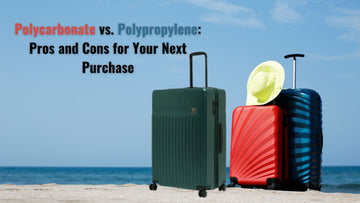When it comes to choosing durable luggage materials, travelers often find themselves comparing polycarbonate vs polypropylene. Both materials are widely used in hard shell luggage, offering distinct advantages based on durability, weight, and flexibility. Whether you're searching for the best lightweight luggage or a suitcase that can withstand rigorous travel conditions, understanding these materials is crucial. Let’s explore their pros and cons to help you make the best choice for your next purchase.
Understanding Luggage Materials
Hard shell luggage has gained immense popularity among frequent flyers and casual travelers alike. Its ability to protect belongings from external impacts makes it a preferred choice over soft-shell alternatives. However, the material of the hard shell plays a significant role in determining its performance.
Two of the most common materials used in hard shell luggage are polycarbonate and polypropylene. While polycarbonate is known for its exceptional strength and impact resistance, polypropylene stands out for being lightweight and flexible. Choosing between these materials depends on your travel priorities—durability, portability, or affordability.
For those seeking premium cabin luggage options, check out Eume World’s cabin luggage collection, featuring stylish and functional designs tailored for modern travelers.
What is Polycarbonate Luggage?
Polycarbonate is a high-performance thermoplastic commonly used in industries requiring durability, such as aerospace and security. Its application in luggage manufacturing has revolutionized the market, offering travelers a reliable option for protecting their belongings.
Benefits of Polycarbonate Luggage
-
Exceptional Durability: Polycarbonate is highly impact-resistant, making it ideal for frequent travelers who face rough baggage handling.
-
Sleek Design: Its glossy finish gives it a premium appearance often favored by style-conscious travelers.
-
Shape Retention: Polycarbonate holds its shape over time, even with regular use.
-
Scratch Resistance: Many polycarbonate suitcases feature advanced coatings that minimize visible scratches.
Drawbacks of Polycarbonate Luggage
-
Heavier than Polypropylene: While still lighter than metal suitcases, polycarbonate is slightly heavier compared to polypropylene.
-
Higher Cost: Its premium features come at a higher price point.
-
Surface Scratches: The glossy finish can show minor scratches more easily than textured surfaces.
Who Should Choose Polycarbonate?
If you’re a frequent traveler or someone who values durability over weight, polycarbonate luggage is an excellent investment. It’s particularly suitable for checked baggage since it can withstand significant impacts without cracking. Explore Eume World’s check-in luggage collection to find durable polycarbonate options crafted for long-term use.
What is Polypropylene Luggage?
Polypropylene is another thermoplastic polymer widely used due to its flexibility and lightweight nature. It’s the lightest material among hard shell luggage options, making it a favorite for travelers aiming to minimize baggage weight.
Benefits of Polypropylene Luggage
-
Lightweight: Ideal for travelers who want to avoid excess baggage fees or simply prefer lighter suitcases.
-
Flexible and Shock-Absorbent: Its pliability allows it to absorb impacts without cracking.
-
Affordable: Generally more budget-friendly than polycarbonate options.
-
Resistant to Moisture and Chemicals: Perfect for travel in humid or rainy conditions.
Drawbacks of Polypropylene Luggage
-
Less Durable Over Time: While flexible, polypropylene may show signs of wear faster than polycarbonate.
-
Limited Aesthetic Appeal: The textured surface lacks the sleek look of polycarbonate.
-
Prone to Warping: Extended exposure to extreme temperatures can cause deformation.
Who Should Choose Polypropylene?
If you prioritize portability and affordability over long-term durability, polypropylene luggage is a great choice. It’s especially suitable for carry-ons or short trips where weight matters most. Check out Eume World’s trunk collection for versatile polypropylene options designed for practical use.
Comparison: Which One is More Durable?
When comparing polycarbonate vs polypropylene, several factors come into play:
1. Strength
-
Polycarbonate: Known for its toughness; resists cracks and dents even under heavy stress.
-
Polypropylene: Flexible but less robust; more prone to warping with frequent use.
2. Weight
-
Polycarbonate: Slightly heavier but still manageable.
-
Polypropylene: The lightest hard shell option, ideal for weight-conscious travelers.
3. Flexibility
-
Polycarbonate: Rigid yet impact-resistant; holds its shape well over time.
-
Polypropylene: Highly flexible; can absorb shocks but may lose shape with prolonged use.
4. Scratch Resistance
-
Polycarbonate: Offers better scratch resistance with advanced coatings.
-
Polypropylene: Textured surface hides scratches but attracts dirt more easily.
5. Longevity
-
Polycarbonate: Outlasts polypropylene in terms of wear and tear.
-
Polypropylene: May need replacement sooner due to its lower durability.
Best Luggage Options in Each Category
Here are some top-rated options for both materials:
Top Polycarbonate Suitcases
-
Features: Aerospace-grade shell, sleek design
-
Best For: Lightweight carry-on with premium durability.
-
Features: Scratch-resistant finish
-
Best For: Frequent travelers seeking luxury and resilience.
-
Features: Exceptional durability
-
Best For: Long-term reliability in checked luggage.
Top Polypropylene Suitcases
-
Features: Lightweight build
-
Best For: Budget-conscious travelers prioritizing portability.
-
Features: Affordable price
-
Best For: Casual trips with minimal wear-and-tear concerns.
-
Features: Shock absorption
-
Best For: Travelers needing flexibility at an affordable price.
Conclusion: Which One Should You Choose?
The choice between polycarbonate and polypropylene ultimately depends on your travel needs:
Choose polycarbonate luggage if you value durability, scratch resistance, and long-term reliability. It’s the best option for frequent flyers or those carrying fragile items.
Opt for polypropylene luggage if you prioritize lightweight convenience and affordability. It’s ideal for short trips or occasional travel where weight matters most.
By understanding the strengths and weaknesses of each material, you can confidently select the right suitcase for your next adventure! Explore Eume World’s collections to find premium cabin bags or check-in options tailored to your needs.
FAQs
-
Is polycarbonate better than polypropylene for luggage?
Yes, polycarbonate is more durable and impact-resistant than polypropylene but slightly heavier and pricier.
-
Which material is more durable for travel bags?
Polycarbonate offers superior durability compared to polypropylene due to its rigidity and resistance to wear over time.
-
What is the lightest hard shell luggage material?
Polypropylene is the lightest hard shell material available, making it ideal for those prioritizing portability.
-
Does polycarbonate scratch easily?
While some glossy finishes may show scratches, many polycarbonate suitcases now include scratch-resistant coatings.
-
Which material is better for checked luggage?
Polycarbonate is better suited for checked luggage due to its high impact resistance and ability to protect contents under rough handling conditions.




